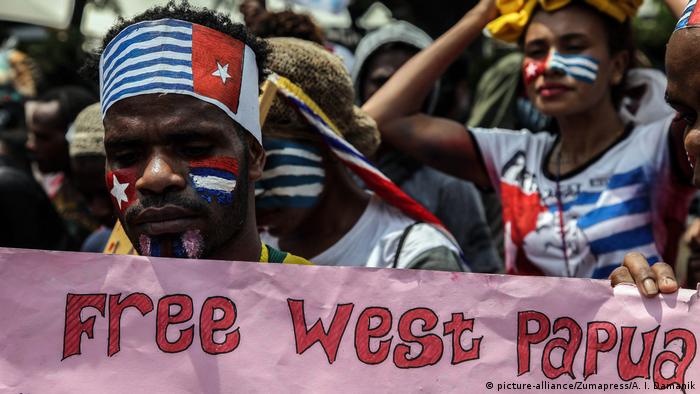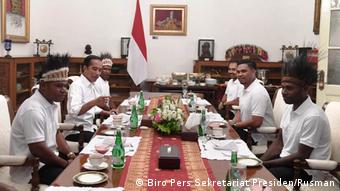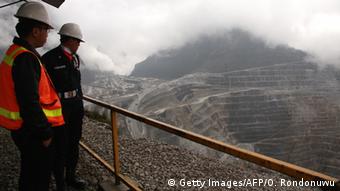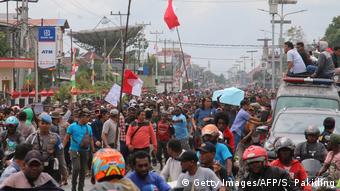The recent unrest in Papua in the extreme East of Indonesia are a result of a policy of discrimination and exploitation. Peace activists demand that Jakarta, a political solution will open.

Violent protests and clashes between indigenous people and security forces in the Indonesian province of Papua have again thrown a spotlight on the decades-old conflict. Trigger a mid-August, the Internet-spread Video about racist Remarks by Indonesian police officers against students from Papua was. The incident occurred in the city of Surabaya on Java, one of the four main Islands of Indonesia. The students had allegedly dishonored an Indonesian flag in your Dorm.
In the following protests and demonstrations for independence in Papua (article image) came according to official data, ten people were killed, including a soldier. The government dispatched 6000 additional security forces in the Region, over the Internet lock has been imposed. Four Australians were recognised for their participation in the demonstrations.

The Indonesian provinces of West Papua (Papua Barat) and Papua (a geographer.: West-Papua)
“Deep-rooted discrimination”
Since Indonesia’s 1963 began, the former Dutch colonial territory, the Western half of the huge island of new Guinea from the North-Australia, now suggests there is resistance from the Papuans. These are “ethnic Melanesians, who feel culturally more to the Pacific belonging to the different look, a different culture than the West-Indonesians, who are there settled in the last few decades,” explains Normann Voß from the West Papua network, which campaigns for a peaceful solution to the conflict. “There is no historical or linguistic connection between Papua and Indonesia”, recently confirmed to the DW Benny Wenda, the exiled advocate of the Papuans. The discrimination of the Papuans have been deeply rooted within the Indonesian security apparatus deep: “and beat us and call us monkeys.”

Indonesia led the way to independence: President Sukarno. For him, the extraction of West Papua from the Netherlands was the again non-negotiable.
The “Act of No Choice”
Historical background: in 1949, Indonesia from the Netherlands became independent, the latter kept but first of all, the sovereignty over West new Guinea. The Netherlands agreed, in 1963, in the so-called New York agreement, the area was the Indonesian government. However, with one condition: In the event of a referendum (the”Act of Free Choice”) should vote on the Papua to remain in Indonesia. This vote of 1969 was held. A small number of carefully selected choice of the men spoke, under the supervision of the Indonesian military for remaining in Indonesia. This Farce, of the “Act of No Choice” by Papuans is called, was nevertheless sanctioned by the UN.
“The Papuans say today: That was our voice,” says Norman Voss from the West Papua network. “We have just been passed from one administration to another. And this Referendum, as it stands in the Treaty, is to be finally carried out.”

Indonesia re-elected President Widodo (2. v. l. above) receives an emissary from the land of Papua. Widodo had stopped the policy of targeted resettlement to Papua.
Stronger role for the UN demanded
Papua activist Benny Wenda said, in January 2018, he will have handed over a Petition of 1.8 million people for the holding of a referendum on the independence of UN human rights Commissioner Michelle Bachelet. Because in addition to the requirement for independence, it is also a question of human rights violations by the Indonesian security forces in Papua, the meet, according to a study of the Legal faculty of the University of Yale 2005 the offence of genocide. Whether this serious allegation is to prove, is doubtful. The investigation of specific cases through the UN is trying to be difficult, such as Norman Thomas explained: “A UN human rights team, since a two years to enter. This has been denied so far.”

In exile, leader of the Papuan, Benny Wenda (2. v. l.) passes Peitition for self-determination at the UN human rights Commissioner Michelle Bachelet in Geneva
Criticism of Pacific neighbours
After all, the international pressure on Jakarta to open in Papua, something grows. The Forum of the Pacific island States had reaffirmed at its Meeting in August, although the sovereignty of Indonesia over the territory. At the same time, the heads of state of the 18 member States want to conduct “an open and constructive dialogue with Indonesia about the reported human rights violations in Papua.” You are welcome, “the fact that Indonesia has issued an invitation to the UN high Commissioner for human rights to dispatch a Mission to the land of Papua.” They are calling on both sides to come up with a date for the visit, and a specific investigation report is available at the next Meeting of the forum in the coming year.

Since 1967, US company Freeport operates in West Papua’s Gold and copper mines belonging to the world’s largest.
Development through exploitation
Even if it should come to such a visit, together with the report, are likely to be satisfied the demands of the Papuans so little. They insist on a fundamental Change of the Situation in their ancestral Land, the Australian expert Jason MacLeod describes as “economic exploitation on a large scale” and “plundering”. In the two provinces of Papua and West Papua take place “development as a colonization”. The concrete impact on the lives of the population of MacLeod described in the Australian broadcasting: “The people who live on the edge of the gigantic Gold and copper mine, Freeport, were driven from their Land. Weekly, if not daily, they are exposed to harassment by security forces, which are often in the Pay of the mine operators.”

20 years ago East Timor was independent. The government of Francisco Guterres (2.v.r.) does not support the Papuan activists, however.
Differences between East-Timor and Aceh
A Modification of these conditions, see the Papua activists only through independence to reach. But independence of the soil Gas, copper, Gold) resources (rich, blessed region Jakarta excludes categorically. It legally stands on safe ground: The UN had agreed to the return by the Netherlands in the course. The case of the former Portuguese colony of East Timor was different: The UN had never recognized that East Timor, which in 1975 from Portugal, was left to his fate, belongs to Indonesia. In 1999, the East Timorese managed to gain after years of struggle against Indonesian troops with UN support for the independence.
A former troubled province of Indonesia, at the opposite, Western end of the island Empire, could not be pacified after decades of confrontation between separatists and the Central government: The province of Aceh in 2005 was given far-reaching autonomy rights, the former militant fighter acquisitions. of switch positions in administration and politics, a process that supports international and was accompanied by, among others, the EU.

Street protests in Papua on 21. August 2019
Knotty Situation
Could be used Aceh as a model for a solution to the conflict in Papua? No, says Norman Voß, because a Statute of autonomy for Papua and West Papua (since 2003, there are two provinces) give it already, it’s just never been implemented. “The Papua say the majority of: autonomy as a concept does not seem to work for us. We looked at the last 15, 20 years, and seen The works of the Indonesian side of the political will is not there to let us have so much free Hand. And that is why it is very unlikely that the Papuans can be in the short or medium term, the excuses, to demand independence.”
A knotty Situation, acknowledges that arrests of the expert from the West Papua network, and still requires a political solution: “A further spiral of violence, of demonstrations, Intervention by security forces, mass, and so on leads to no good end. The United liberation movement for West Papua (UMLWP) and the government in Jakarta to sit down at a table and try to resolve this conflict in a sustainable way. As this solution looks, it must of course be between those parties to the conflict found. But the space should be created. Since each state is well advised to urge Indonesia to promote such a process.”